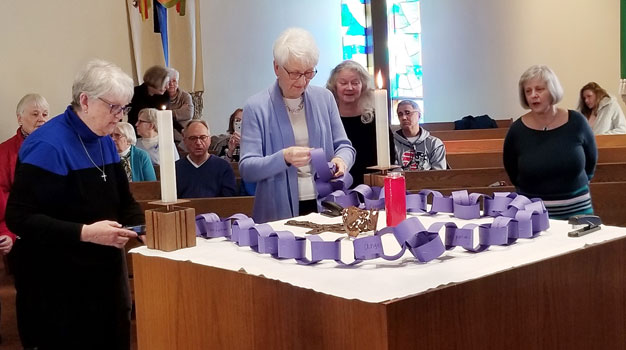
Sisters Mary Bea Snyder and Mary Ann Vogel of the Congregation of the Humility of Mary attach blue paper links to a chain Jan. 26 at St. Alban’s Episcopal Church in Davenport during an ecumenical prayer service to end human trafficking.
By Lindsay Steele
The Catholic Messenger
DAVENPORT — What does oppression mean to you?
Participants of a prayer service to end human trafficking pondered this question as they held strips of blue construction paper in their hands. Each participant wrote a word or phrase on the construction paper and formed a chain of responses on the altar at St. Alban’s Episcopal Church.
Once participants completed the chain they gathered around the altar, ripped up the paper links and symbolically broke the chain of bondage and oppression caused by human trafficking.
Attacking Trafficking of the Quad Cities organized the ecumenical prayer service held Jan. 26 to commemorate National Slavery and Human Trafficking Prevention Month. The yearly prayer service of Attacking Trafficking aims to raise awareness and help victims. U.S. law defines human trafficking as the use of force, fraud or coercion to compel a person into commercial sex acts or labor or services against his or her will. By law, all commercial sex involving a minor is human trafficking.
Ann Mohr, president of Attacking Trafficking and a member of St. Ann Parish in Long Grove, said human trafficking happens in the Quad Cities and the tragedy of it is “really pretty simple” to understand. It turns a child of God into a possession to exploit. “They are no less a child of God than we are,” Mohr explained.
The Rev. Judith Dalmasso, pastor of St. Alban’s, offered the opening prayer. “Oh Lord, you said you came ‘to set the captives free.’ In our world, young men and women who are trafficked are modern day slaves. … May the awareness of this horrendous crime spread throughout the world and may many join the efforts to stop trafficking and help the victims begin anew, filled with hope.”
Following the prayer, Story Singers of St. Ambrose University led guests in a simple song. “Surely love is in this place. Holy ground,” they sang, changing the word love to hope, freedom, strength and faith in subsequent verses.
A survivor offered her perspective on human trafficking, noting that she wasn’t aware she had been trafficked as a young teenager until she learned more about it in college. Now, as a survivor advocate, she tries to help survivors understand that “what happened to them doesn’t define who they are.”
Advocating has helped her find “purpose in the pain,” but she admitted that healing is an “everlasting” process. “What is happening is awful. We need to be the light. Each and every person is worthy and valuable and everyone deserves (the freedom to pursue) happiness,” she said.
Mohr thanked the survivor for sharing her story with prayer service participants. “You are one of the strongest people I know,” she said.
As the group ended the prayer service with the making and breaking of the blue construction paper chain, Attacking Trafficking’s treasurer, Jane Campana, explained the reasons why blue is associated with human trafficking awareness. “It represents the sadness and coldness of human trafficking, but also the hope and prayers” of those who are committed to ending it. The group sang Amazing Grace as they collectively broke the chain.
Mohr expressed hope that God would hear the prayers of the faithful so that individuals involved in human trafficking, and those at risk, “aren’t subject to that kind of life.”











